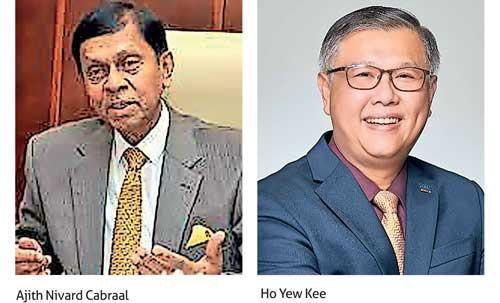Reply To:
Name - Reply Comment
Safe re-opening of the economy from lockdowns is imperative for Sri Lanka to push through its recovery after the country was emerging out of the pandemic induced recession in 2020 which left large slacks in many areas and sectors, awaiting to be regained and recovered to their full capacities, according to new Central Bank Governor Ajith Nivard Cabraal.
 Sri Lanka’s economy recorded a robust return in the first half of 2021, partly due to the low base effects in 2020 recording an 8 percent growth in its Gross Domestic Product, recovering from 3.6 percent contraction in 2020, which was solely responsible for the pandemic.
Sri Lanka’s economy recorded a robust return in the first half of 2021, partly due to the low base effects in 2020 recording an 8 percent growth in its Gross Domestic Product, recovering from 3.6 percent contraction in 2020, which was solely responsible for the pandemic.
But multiple sectors in the economy such as travel, hospitality & leisure, entertainment, which are closely associated with events and other recreational activities, where in-person presence is indispensable, fell below their capacity from pre-pandemic levels.
“Opening out the country after lockdowns is a priority and I have been a proponent that we should open as fast as possible, with of course the COVID related protocols in place”, Cabraal said addressing the inauguration ceremony of the three day CMA Sri Lanka National Management Accounting Conference for 2021 that kicked off on Monday.
Sri Lanka has remained under lockdowns for six weeks from August 20 to prevent the hospital sector being overwhelmed from the rising virus cases and the fatalities but the restrictions which were more lenient than earlier rounds had a severe toll on certain industries causing widespread layoffs, resignations, and early retirements,.
However, as the country is set to lift its lockdown orders under health guidelines on October 1, the former Prime Minister and now Opposition MP Ranil Wickremesinghe told in an online interview that the lifting of lockdowns could be extended if the government fails to purchase the required diesel fuel to meet the recovery in demand.
In the same interview he said the pressing issue for the country was to bolster its dwindling foreign reserves. But the fact which may have eluded him was that the reserve re-building can’t happen in a dormant economy without the revival of tourism trade and the direct investment flows which together account for at least US$ 6 billion per annum, much higher than what the country needs to service its foreign currency debt which is about US$ 4.0 billion per annum.
Speaking at the CMA Annual Conference was Ho Yew Kee, a Professor in Accounting at the Singapore Institute of Technology, who underscored the need to return to business as usual while taking the safeguards to keep the pandemic at bay.
“Our priority is to get the people back to work and get us back into the normal way of life - business as usual - and finally to re-open the border,” he said citing the blow that was dealt to the Singaporean economy by the plunge in air passengers from 34.1 million in 2019 to 5.8 million in 2020. Singapore’s US$ 372 billion economy contracted by 9.2 percent in 2020 due to economic ramifications brought about by the pandemic.
Presenting the case of Singapore in reviving the economy post COVID-19, Professor Kee presented the three-pronged approach followed to keep Singapore’s economy humming again, which included vaccination, screening and testing and isolating the infected to prevent further infections.
According to Professor Kee around 81 percent of the Singapore population is now vaccinated.
“So in the post COVID, one of the most important things is restarting economy, both internally and externally,” he said.
“So, we have come to a conclusion that having a zero infection rate is not possible. So, in other words we will still have to open up the economy, bring us back to normality in the midst of a pandemic and to change the pandemic into an endemic”, he added.
However he emphasised on crucial reforms aimed at re-inventing education, re-skilling employees, re-capitalising industries and re-branding the country to become competitive and successful in the post pandemic world economy.